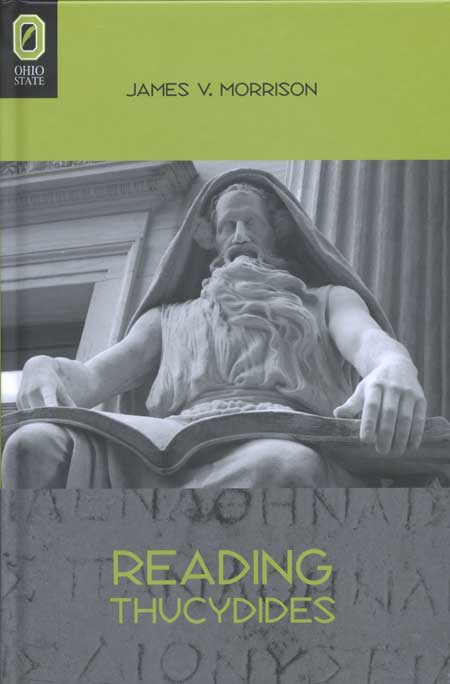click here to read excerpts from the book
 Reading Thucydides
Reading Thucydides
James V. Morrison
“This is a splendid book. No one has demonstrated more clearly than James Morrison that the History, no less than Plato’s dialogues, was a transitional document between oral and literate methods of instruction and guidance on those very matters that are the most important in life.” —Kevin Robb, University of Southern California
“The author has written a smooth exposition of how the ‘participatory’ experience works for the reader of Thucydides, emphasizing the historian’s use of multiple perspectives, authorial reticence, balance, and refusal to come to ‘closure’ in a narrative. Considering that Thucydides is so famously opaque and ‘contort,’ to quote one Victorian, the lucidity and reader-friendliness of this book are remarkable.” —Daniel P. Tompkins, Temple University
“Reading” Thucydides in antiquity may have differed significantly from our own modern experience. Although it is natural for us to speak of “readers,” this book demonstrates that Thucydides is a transitional figure between the predominantly oral culture of fifth-century BCE Athens and the more literate culture that followed. Thucydides describes his work as “a possession forever,” yet he acknowledges that those listening may find it “less than delightful.” Is he writing, therefore, for readers or listeners?
In Reading Thucydides, James V. Morrison proposes a “hybrid” reception model, arguing that Thucydides’ History may be regarded as a pivotal work that seeks to recreate the earlier world of spoken argument, yet it does so as a text that may be read and reread—and heard and heard again.
Thucydides challenges his readers in many ways. Morrison finds the reader’s experience to be the result of deliberate strategies on Thucydides’ part. Indeed, the History is an interactive work that engages readers by encouraging them to adopt the position of figures within the work, to project themselves into the past, and to view what is past as part of an indeterminate future. The “participatory” nature of Thucydides’ narrative, like Plato’s dialogues a generation later, reflects the transition from orality to the rise of public and private reading.
Reading Thucydides brings clarity to the historian’s working methods in a highly readable, accessible style. Thus it will appeal not only to scholars but to advanced undergraduate and graduate students in history and classics.
James V. Morrison is Paul C. Cantrell Professor and Chair of Classical Studies at Centre College.
|
Oct 2006 History/Ancient/Greece; Literary Criticism/Ancient & Classical 282 pp. 6x9 |
|
| $64.95 cloth 978-0-8142-1035-2 | Add cloth to shopping cart |
| $14.95 CD 978-0-8142-9112-2 | Add CD to shopping cart |


